We believe that key community-engaged scholarship is key to broadening access to the proverbial ivory tower and making sure that the fruits of academic labor—the wealth of knowledge and emerging applications—are accessible to society beyond the confines of the academy.
Public engagement
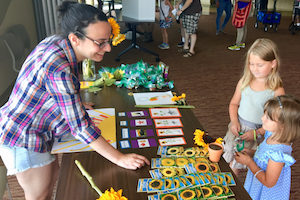 Members of our lab regularly seize public engagement opportunities to pique people’s curiosity in science. In addition, we collaborate with Sunset Zoo and other community partners to provide new platforms in the Manhattan (KS) region that allow scientists to reach out to public audiences through informal, discussion-based presentations, and we generate opportunities for K-12 teachers to get hands-on science experiences. With the help of NSF and the K-State Center for Engagement and Community Development, we currently focus on the following projects:
Members of our lab regularly seize public engagement opportunities to pique people’s curiosity in science. In addition, we collaborate with Sunset Zoo and other community partners to provide new platforms in the Manhattan (KS) region that allow scientists to reach out to public audiences through informal, discussion-based presentations, and we generate opportunities for K-12 teachers to get hands-on science experiences. With the help of NSF and the K-State Center for Engagement and Community Development, we currently focus on the following projects:
- Kansas Science Festival: KSF aims to serve as a bridge that brings people together in the spirit of community-developed knowledge and sustainable relationships. We are on a mission to make science accessible to communities in the greater Manhattan area, inspire the next generation of scientists, and to ensure that all understand that the quest for knowledge is a journey that is fun. At the same time, it is important to us that we emphasize that science is not only practiced within the confines of the proverbial ivory tower, but that people from all walks of life practice it in and outside their professions.
- Science on Tap: Held in a relaxed setting at a local brewery, Science on Tap features a brief, informal presentation by a local scientist followed by lively conversation. Science on Tap is held monthly at Manhattan Brewing Company.
- Teacher research experiences: We provide professional a development program for K-12 teachers, connecting them with educators and researchers to build capacity in implementing the Next Generation Science Standards (NGSS).
- Zoo exhibition: We are collaborating with Sunset Zoo to create a permanent exhibit showcasing extremophile fishes and their ancestors. Connecting to the interpretive themes of the zoo, the exhibit explains how biological research, such as our work on extremophile fishes, can benefit society and contribute to species conservation in their natural environment.
Collaboration with media producers
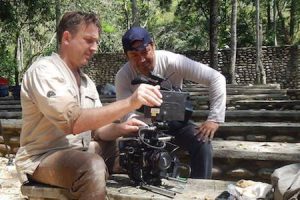 We strive to be active collaborators in the production of online, print, radio, and TV media. To do so, writers, photographers, and camera teams have accompanied our expeditions to Mexico. Past participants included people working for GEO magazine, Mona Lisa Productions, and the BBC. These efforts have contributed – amongst others – to a children’s book on cave animals, features in magazines, and TV documentaries (“Life in Hell” and “Mexico: Earth’s Festival of Life“).
We strive to be active collaborators in the production of online, print, radio, and TV media. To do so, writers, photographers, and camera teams have accompanied our expeditions to Mexico. Past participants included people working for GEO magazine, Mona Lisa Productions, and the BBC. These efforts have contributed – amongst others – to a children’s book on cave animals, features in magazines, and TV documentaries (“Life in Hell” and “Mexico: Earth’s Festival of Life“).
Science communication workshops
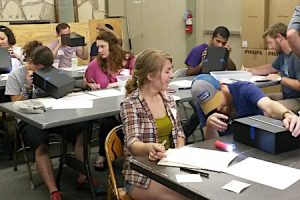 Involvement of scientists in outreach and public service is critical to shape the public’s scientific literacy and attitudes towards science. Nonetheless, scientists do not typically receive training on how to engage a broader audience that does not have some degree of training in their field, and how to effectively communicate complex concepts and their relevance to everyday life. In collaboration with Jared Bixby and Nicole Wade, educators at Sunset Zoo in Manhattan (KS), as well as various entities associated with Kansas State University, we have created professional development opportunities in science communication for undergraduate students, graduate students, postdocs, and faculty members. Workshops focus on audience analysis, message design, storytelling, and visual communication. In addition, the Science Communication Fellowship program focuses on three goals: (1) Participants reflect and discuss the broader relevance of their specific research projects. (2) They are taught to develop skills to initiate and carry an interactive conversation about science with members of the public. (3) They create novel, hands-on educational activities that are prototyped and refined with an actual public audience and subsequently presented at public engagement events at the zoo and local schools.
Involvement of scientists in outreach and public service is critical to shape the public’s scientific literacy and attitudes towards science. Nonetheless, scientists do not typically receive training on how to engage a broader audience that does not have some degree of training in their field, and how to effectively communicate complex concepts and their relevance to everyday life. In collaboration with Jared Bixby and Nicole Wade, educators at Sunset Zoo in Manhattan (KS), as well as various entities associated with Kansas State University, we have created professional development opportunities in science communication for undergraduate students, graduate students, postdocs, and faculty members. Workshops focus on audience analysis, message design, storytelling, and visual communication. In addition, the Science Communication Fellowship program focuses on three goals: (1) Participants reflect and discuss the broader relevance of their specific research projects. (2) They are taught to develop skills to initiate and carry an interactive conversation about science with members of the public. (3) They create novel, hands-on educational activities that are prototyped and refined with an actual public audience and subsequently presented at public engagement events at the zoo and local schools.
Kansas Science Communication Initiative
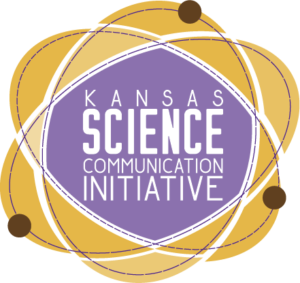 We are participating in the Kansas Science Communication Initiative (K-SCI). K-SCI brings together researchers, communicators, and community partners to engage diverse audiences in understanding, enthusiastically promoting, and actively participating in science and research. In fall 2017, we organized the first Science Communication Week at K-State, to communicate science and celebrate big ideas. The week included community outreach events and professional development opportunities for scientists and communicators, featuring – among others – NPR science correspondents Joe Palca and Maddie Sofia as well as National Geographic photographer Jim Richardson.
We are participating in the Kansas Science Communication Initiative (K-SCI). K-SCI brings together researchers, communicators, and community partners to engage diverse audiences in understanding, enthusiastically promoting, and actively participating in science and research. In fall 2017, we organized the first Science Communication Week at K-State, to communicate science and celebrate big ideas. The week included community outreach events and professional development opportunities for scientists and communicators, featuring – among others – NPR science correspondents Joe Palca and Maddie Sofia as well as National Geographic photographer Jim Richardson.
“Just Ask a Scientist”
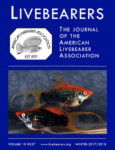 “Just Ask a Scientist” is a new column in the Livebearer, the journal of the American Livebearer Association. It provides fish hobbyists with an avenue to ask questions about the biology of livebearing fishes they keep in their aquaria that are then answered by a scientist with matching expertise. Interested people should become a member of the American Livebearer Association and send their questions directly to Michi; he will do his best to answer their question or find somebody that can. The first installments covered the following questions:
“Just Ask a Scientist” is a new column in the Livebearer, the journal of the American Livebearer Association. It provides fish hobbyists with an avenue to ask questions about the biology of livebearing fishes they keep in their aquaria that are then answered by a scientist with matching expertise. Interested people should become a member of the American Livebearer Association and send their questions directly to Michi; he will do his best to answer their question or find somebody that can. The first installments covered the following questions:
- Do Poeciliid livebearers receive any nourishment from their mother (like goodeids) or are they truly just eggs laid inside the parent?
- What fishes have livebearing poeciliids evolved from, and what are they most closely related to?
- How are you conducting your trips to catch livebearers, and what are you actually doing in the field?
- Some of my platyfish males have a gravid spot, are they hermaphrodites?
- I recently heard that the Amazon molly is a species without males. Is that true? How is that even possible?
- What is behind the mysterious “livebearer wasting disease”?
- Why do hi-fin swordtails and platies not breed true?
- What do you pay attention to when you decide what to feed?
- Why are the sex ratios off in some of my livebearers?
Other popular science articles have been published in AMAZONAS magazine over the past years (check here for a complete listing).
